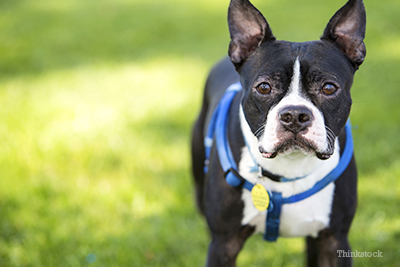Editor’s Note: This article has been updated here.
Do you live in Chicago and bring your dog to the dog park? Then you may have heard about the recent outbreak of Canine Influenza virus (CIV) that started in the middle of March of this year. Since then, almost 1000 dogs have been diagnosed with Canine Influenza virus, according to Time.com, and 5 deaths have been reported.  Unfortunately, Canine Influenza virus is highly contagious and can be potentially fatal. It was first isolated in 2004, in Florida, at a Greyhound racing track. Since then, the virus has been seen in multiple states (approximately 40 and counting), according to a Merck Press release1. As this is a newer virus, most dogs are susceptible, and haven’t built up immunity to it. As a pet guardian, know that CIV is not contagious to humans.
Unfortunately, Canine Influenza virus is highly contagious and can be potentially fatal. It was first isolated in 2004, in Florida, at a Greyhound racing track. Since then, the virus has been seen in multiple states (approximately 40 and counting), according to a Merck Press release1. As this is a newer virus, most dogs are susceptible, and haven’t built up immunity to it. As a pet guardian, know that CIV is not contagious to humans.
Canine Influenza is not kennel cough
Keep in mind that Canine Influenza virus is not the same thing as Bordetella bronchiseptica (which is more commonly known as Kennel Cough). That said, both infections can be spread the same way: by transmission through direct contact with respiratory discharge from infected dogs (contact with the nasal discharge, etc.); by air through sneezing, barking, coughing; or by exposure to contaminated objects (such as dog bowls, cages, clothing, etc.)
Depending on the severity of the infection, Canine Influenza can result in severe damage to the lungs along with secondary pneumonia. Due to the rapid ability of CIV to spread, it’s estimated that up to 20% of dogs can develop severe pneumonia as a result. Clinical signs of CIV can be seen less than 5 days after infection1.
Symptoms of Canine Influenza
Symptoms include:
- Coughing
- Excessive panting
- Exercise intolerance
- Discharge from the nose
- Not eating
- Lethargy
- Fever
- Difficulty breathing
- Blue-tinged gums
- Lung failure (e.g., acute respiratory distress syndrome)
- Death
If your dog shows any of these signs, contact your veterinarian immediately. If your dog is having difficulty breathing, get to your emergency veterinarian – even if it’s in the middle of the night! Thankfully, there is a test for CIV – your veterinarian can send swabs from the nose and pharynx (upper airway/mouth) directly out for testing.
Here are some tips for bringing your dog to the veterinarian:
- If you’re going to your family veterinarian, ideally, your dog should be seen as one of the later appointments in the day, to prevent exposure to other dogs.
- If your dog is showing clinical signs, your dog should be taken immediately back into an examination room instead of potentially exposing other dogs in the waiting room.
- If your dog requires hospitalization, it will mean isolation in a separate area of the veterinary practice to prevent spreading the infection to other dogs. (Even the air supply to the isolated area should be separated by a door, wall or separate ventilation system to prevent transmission through the hospital).
- When hospital staff handle a dog with CIV, they should use gloves and a gown to prevent cross-contamination to other patients. When exiting the isolation room, shoes should be disinfected (with a footbath) to prevent spread of CIV through the hospital.
- Staff should thoroughly wash their hands with soap and water or use an alcohol-based hand sanitizer after handling infected dogs.
Thankfully, traditional veterinary disinfectants can kill Canine Influenza virus easily with appropriate hygiene, isolation, and sanitation procedures.
Blood work and x-rays should be done to assess the white blood cell count, oxygen level and severity of pneumonia in the lungs. Treatment for mildly affected dogs with CIV may range from isolation from other dogs (for at least 2 weeks), to a course of antibiotics and anti-cough medication (only after x-rays have been done). For dogs that are more severely affected and require hospitalization, additional therapy may include:
- Oxygen therapy
- IV fluids to help keep your dog hydrated
- IV antibiotics
- Nutritional support
- Anti-vomiting medication if needed
- Isolation from other dogs for at least 2 weeks
As a result of this outbreak, pet guardians in outbreak areas should avoid these spots until the outbreak ceases:
- Doggy day cares
- Dog parks
- Kennels
- City streets with high exposure to other dogs
- Dog shows
- Grooming facilities
- Vaccine clinics
- Pet stores
Thankfully, there is a vaccine for Canine Influenza (Nobivac® Canine Flu H3N8, Merck Animal Health). The vaccine has been shown to protect dogs against CIV infection by significantly decreasing clinical signs, reducing viral shedding, and reducing the severity of damage to the lungs. Just like other vaccines, this vaccine needs a booster 2-4 weeks after the first dose (Remember, just one dose is not effective alone, as the body needs to respond to the second vaccine to stimulate the immune system).
Questions to ask your veterinarian:
- Should I vaccinate my dog for canine influenza?
- What is my dog's risk of canine influenza?
- Should x-rays be done?
- Should my dog be referred to the 24/7 specialty clinic for oxygen?
If you have any questions or concerns, you should always visit or call your veterinarian -- they are your best resource to ensure the health and well-being of your pets.
Resources:
- Merck Animal Health Assists Chicago Area Veterinarians with Diagnosis Confirmation the Canine Infectious Respiratory Disease Outbreak. On file with Pet Health Network.
